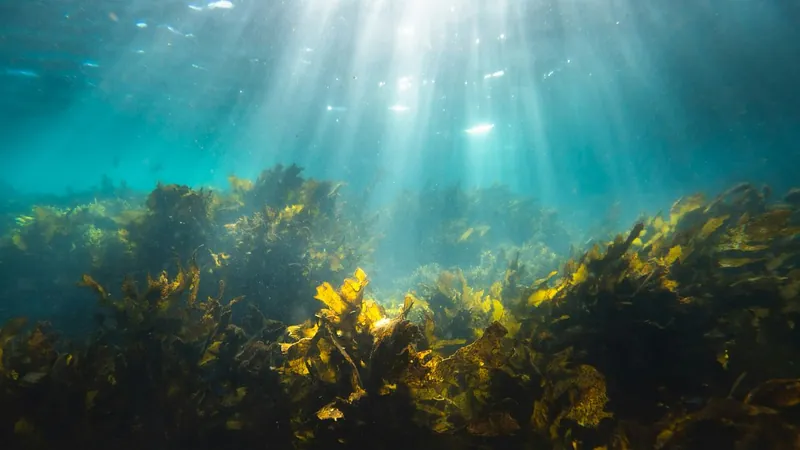
Portugal's Kelp Forests: Hidden Guardians of Carbon Storage at Risk from Climate Change
2025-09-16
Author: Emma
Off the stunning northern coast of Portugal, a groundbreaking study has revealed that marine forests, specifically kelp, play a crucial role in capturing and storing carbon. Scientists from the Interdisciplinary Centre of Marine and Environmental Research (CIIMAR) and the Marine and Environmental Sciences Centre (MARE) have shed light on these underwater wonders.
Kelp: The Unsung Hero of Carbon Sequestration
For the first time, researchers have quantifiably assessed the carbon sequestered by kelp species like Laminaria hyperborea and Saccorhiza polyschides, demonstrating that these habitats significantly bolster marine biodiversity and productivity.
According to Francisco Arenas, a co-leader of the study, "These habitats thrive along Portugal's coast, representing the southernmost limit for several unique species. Their role in the ecosystem is invaluable."
Impressive Numbers Unveiled
The findings, published in the journal Scientific Reports, reveal that these kelp forests store around 16.48 gigagrams (Gg) of carbon across approximately 5,189 hectares—an area larger than 5,000 football fields. Remarkably, despite their smaller size compared to other ecosystems, they capture carbon as effectively, if not more so.
This substantial amount of carbon stored by kelp habitats accounts for 14% of Portugal's blue carbon inventory, previously dominated by salt marshes and seagrass meadows.
A Call to Action as Climate Change Looms
Alarmingly, these vital kelp forests are now under threat from climate change. Researchers estimate they capture one-third of the carbon sequestered annually by Portugal's marine plants. Yet, their contribution to climate mitigation has often been sidelined.
Arenas points out that, "These ecosystems are frequently unknown and undervalued, despite their critical ecological and economic benefits for the region."
Tropicalisation: A New Enemy
A global phenomenon known as tropicalisation, where rising sea temperatures allow tropical species to expand northward, further endangers these marine forests. This shift not only threatens local biodiversity but also jeopardizes the ecological services kelp forests provide, including their vital carbon storage capabilities.
Policy Recommendations for a Sustainable Future
In response to these alarming findings, the researchers advocate for immediate and targeted policies aimed at protecting and potentially restoring these critical zones. Emphasizing their dual function as carbon sinks and essential marine habitats, they stress the urgent need for incorporating kelp forests into marine conservation frameworks at both national and international levels.
As the European Union's Nature Restoration Law begins to take shape, Arenas emphasizes the need for effective ecological restoration techniques, especially in vulnerable habitats with immense potential for supporting ecosystem services.
Time is of the essence, and protecting these kelp forests could be a pivotal step in combating climate change while preserving biodiversity for future generations.









 Brasil (PT)
Brasil (PT)
 Canada (EN)
Canada (EN)
 Chile (ES)
Chile (ES)
 Česko (CS)
Česko (CS)
 대한민국 (KO)
대한민국 (KO)
 España (ES)
España (ES)
 France (FR)
France (FR)
 Hong Kong (EN)
Hong Kong (EN)
 Italia (IT)
Italia (IT)
 日本 (JA)
日本 (JA)
 Magyarország (HU)
Magyarország (HU)
 Norge (NO)
Norge (NO)
 Polska (PL)
Polska (PL)
 Schweiz (DE)
Schweiz (DE)
 Singapore (EN)
Singapore (EN)
 Sverige (SV)
Sverige (SV)
 Suomi (FI)
Suomi (FI)
 Türkiye (TR)
Türkiye (TR)
 الإمارات العربية المتحدة (AR)
الإمارات العربية المتحدة (AR)